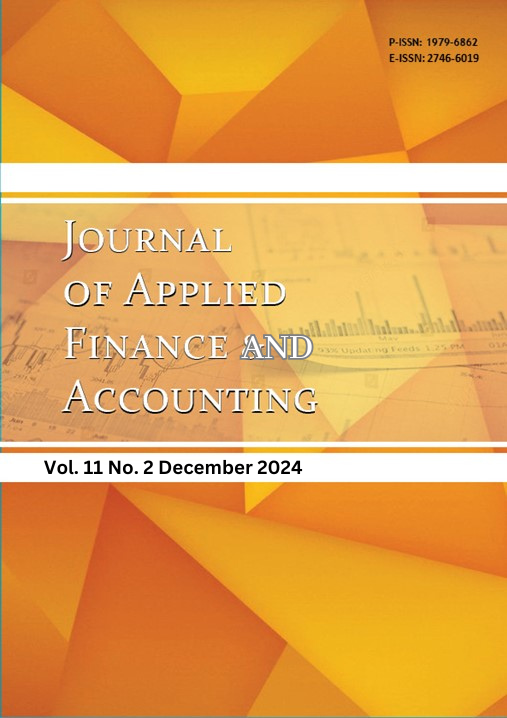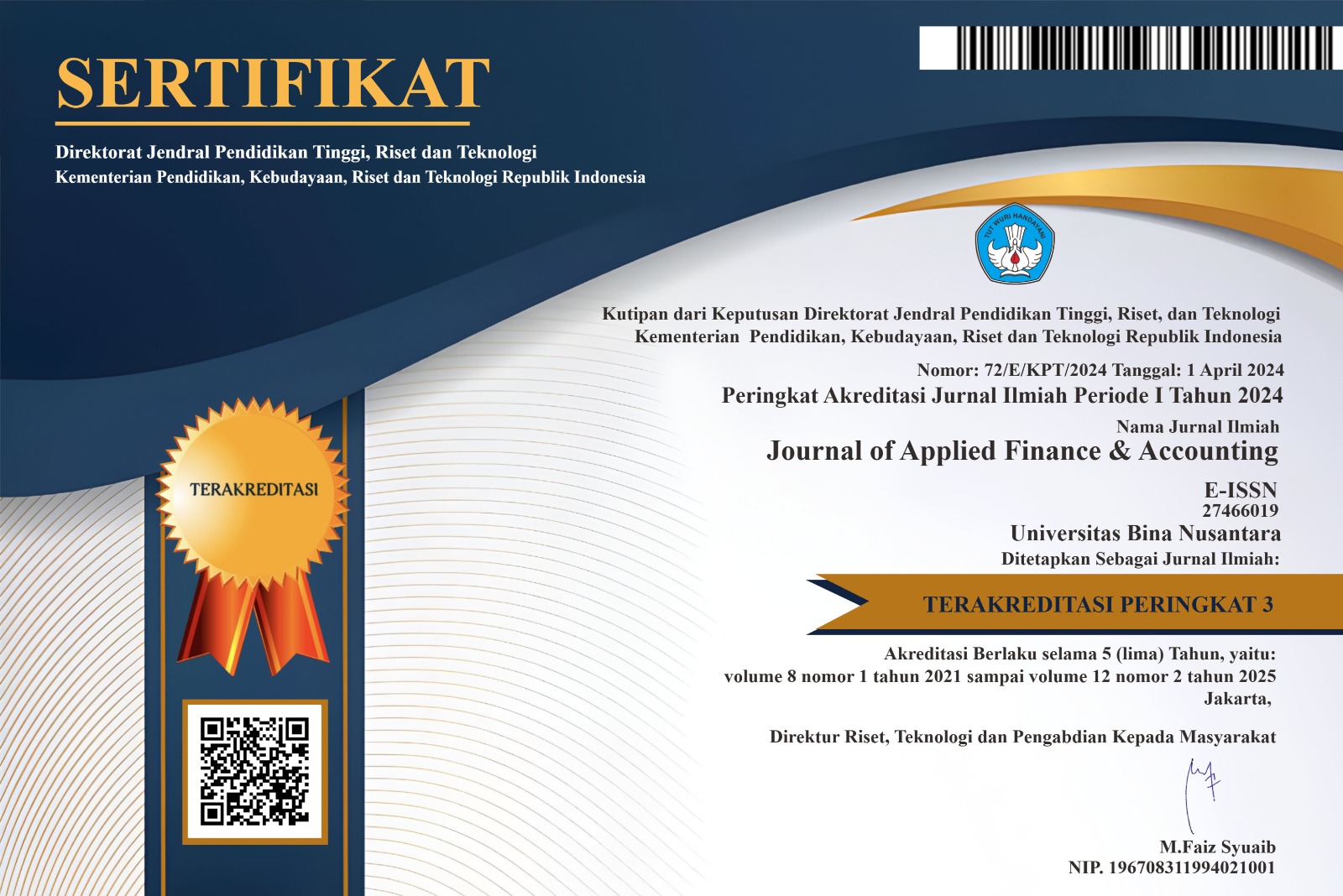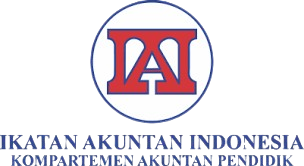EXAMINING BOARD CHARACTERISTICS AND INTEGRATED REPORTING QUALITY: INSIGHT FROM ESG-FOCUSED FIRMS IN INDONESIA
DOI:
https://doi.org/10.21512/jafa.v11i2.12426Keywords:
Board Characteristics, Integrated Reporting Quality, Gender Diversity, CEO Duality, Board IndependenceAbstract
This research aims to look at Indonesian firms and see whether there's a connection between board traits and the quality of their integrated reporting. This study analyzes 52 listed firms from the environmental, social, and governance (ESG) index between 2019 and 2022 using linear regression with panel data to test its assumptions. The data was acquired from annual reports of Indonesian corporations. The acquired empirical data clearly shows that gender diversity appears to significantly improve the integrated reporting quality. Also noteworthy is that board size, independence, and CEO duality are not significantly related. This study has several practical implications in addition to its theoretical implications. Managers, shareholders, and policymakers should take note of these findings, as they are particularly relevant. Therefore, stakeholders should evaluate the precision of disclosure when deciding on the best reporting approach. A more accurate assessment of risk, less stock volatility, more long-term value for shareholders, and an improved company reputation are all outcomes of this. Corporate social responsibility and sustainability literature is lacking, which this article seeks to remedy. It fills a gap in the literature by providing more information about ESG company-specific integrated reporting and corporate governance. This study has important implications for professionals and practitioners who want to raise the bar on the quality of their integrated reports.
References
Butar-Butar, D. T. M., & Indrianto, D. (2024). The Effectiveness of The Board of Directors’ Performance and The Moderation Effect of Corporate Risk Management on The Company’s Financial Performance. Global Financial Accounting Journal, 7(2), 274. https://doi.org/10.37253/gfa.v7i2.8883
Butar-Butar, D. T. M., Yunita, L., & Dewi, S. (2024). The effect of independence and gender of BOD, managerial and institutional ownership, and ownership concentration on tax aggressiveness. Journal of Contemporary Accounting, 1–10. https://doi.org/10.20885/jca.vol6.iss1.art1
Chouaibi, S., Chouaibi, Y., & Zouari, G. (2022). Board characteristics and integrated reporting quality: evidence from ESG European companies. EuroMed Journal of Business, 17(4), 425–447. https://doi.org/10.1108/EMJB-11-2020-0121
Cooray, T., Gunarathne, A. D. N., & Senaratne, S. (2020a). Does corporate governance affect the quality of integrated reporting? Sustainability (Switzerland), 12(10). https://doi.org/10.3390/su12104262
Cooray, T., Gunarathne, A. D. N., & Senaratne, S. (2020b). Does corporate governance affect the quality of integrated reporting? Sustainability (Switzerland), 12(10). https://doi.org/10.3390/su12104262
Dyczkowska, J., Krasodomska, J., & Robertson, F. (2022). The role of integrated reporting in communicating adherence to stakeholder capitalism principles during the COVID-19 pandemic. Meditari Accountancy Research, 30(7), 147–184. https://doi.org/10.1108/MEDAR-07-2021-1381
Fayad, A. A. S., Binti Mohd Ariff, A. H., & Ooi, S. C. (2022a). Dose board characteristics influence integrated reporting quality? Empirical evidence from an emerging market. Cogent Economics and Finance, 10(1). https://doi.org/10.1080/23322039.2022.2140907
Fayad, A. A. S., Binti Mohd Ariff, A. H., & Ooi, S. C. (2022b). Dose board characteristics influence integrated reporting quality? Empirical evidence from an emerging market. Cogent Economics and Finance, 10(1). https://doi.org/10.1080/23322039.2022.2140907
Gerwanski, J., Kordsachia, O., & Velte, P. (2019). Determinants of materiality disclosure quality in integrated reporting: Empirical evidence from an international setting. Business Strategy and the Environment, 28, 750–770. https://doi.org/10.1002/bse.2278
Gresia, S., & Itan, I. (n.d.). The 2nd Conference on Management, Business, Innovation, Education, and Social Science (CoMBInES) OWNERSHIP CONCENTRATION ROLE ON BOARD DIVERSITY AND AUDIT COMMITTEE CHARACTERISTICS ON AUDIT QUALITY.
Halid, S., Mahmud, R., Zakaria, N., & Abdul Rahman, R. (2021). Does Board Monitoring Affect Integrated Reporting Disclosure for Better Transparency and Sustainability? Universal Journal of Accounting and Finance, 9, 1049–1057. https://doi.org/10.13189/ujaf.2021.090515
Hoque, M. E. (2017). International Journal of Economics and Financial Issues Why Company Should Adopt Integrated Reporting? International Journal of Economics and Financial Issues, 7(1), 241–248.
Hristov, I., Chirico, A., & Ranalli, F. (2022). Corporate strategies oriented towards sustainable governance: advantages, managerial practices and main challenges. Journal of Management and Governance, 26(1), 75–97. https://doi.org/10.1007/s10997-021-09581-x
Iredele, O. O. (2019). Examining the association between quality of integrated reports and corporate characteristics. Heliyon, 5(7), e01932. https://doi.org/10.1016/j.heliyon.2019.e01932
Itan, I., Giovani, M., & Butar-Butar, D. T. M. (2024). Corporate Social Responsibility and Company Performance: The Role Of Board Characteristics. Gorontalo Accounting Journal, 7(1), 116. https://doi.org/10.32662/gaj.v7i1.3372
Karina, R. (2021). Corporate governance and earnings management: Does gender matter? Jurnal Akuntansi Dan Auditing Indonesia, 25(2). https://doi.org/10.20885/jaai.vol25.i
Lynch, B. (2010). An examination of environmental reporting by Australian state government departments. Accounting Forum, 34(1), 32–45. https://doi.org/10.1016/J.ACCFOR.2009.11.001
Machmuddah, Z., Rohman, A., Juliarto, A., & Handayani, S. (2023). Do board characteristics moderate the relationship between integrated reporting disclosure and company value Contaduria y Administracion, 68(4), 69–87. https://doi.org/10.22201/fca.24488410e.2023.4604
Martiny, A., Taglialatela, J., Testa, F., & Iraldo, F. (2024). Determinants of environmental social and governance (ESG) performance: A systematic literature review. In Journal of Cleaner Production (Vol. 456). Elsevier Ltd. https://doi.org/10.1016/j.jclepro.2024.142213
Masulis, R. W., Wang, C., & Xie, F. (2012). Globalizing the boardroom—The effects of foreign directors on corporate governance and firm performance. Journal of Accounting and Economics, 53(3), 527–554. https://doi.org/10.1016/J.JACCECO.2011.12.003
Nguyen, H. L., & Kanbach, D. K. (2024). Toward a view of integrating corporate sustainability into strategy: A systematic literature review. In Corporate Social Responsibility and Environmental Management (Vol. 31, Issue 2, pp. 962–976). John Wiley and Sons Ltd. https://doi.org/10.1002/csr.2611
Nishitani, K., Unerman, J., & Kokubu, K. (2021). Motivations for voluntary corporate adoption of integrated reporting: A novel context for comparing voluntary disclosure and legitimacy theory. Journal of Cleaner Production, 322(September), 129027. https://doi.org/10.1016/j.jclepro.2021.129027
Omran M, Ramdhony D, Mooneeapen O, & Nursimloo V. (2021). Integrated reporting and board characteristics: evidence from top Australian listed companies.
Qaderi, S. A., Ghaleb, B. A. A., Hashed, A. A., Chandren, S., & Abdullah, Z. (2022). Board Characteristics and Integrated Reporting Strategy: Does Sustainability Committee Matter? Sustainability (Switzerland), 14(10). https://doi.org/10.3390/su14106092
Ramadana, M., Pratama, V. T., & Butar-Butar, D. T. M. (2024). BREAKING BARRIERS: FEMALE DIRECTORS, EARNINGS MANAGEMENT, AND THE INFLUENCE OF EDUCATION AND SUSTAINABILITY REPORTING. Jurnal Akuntansi Bisnis, 17(2), 198. https://doi.org/10.30813/jab.v17i2.4983
Sjödin, D., Parida, V., Jovanovic, M., & Visnjic, I. (2020). Value Creation and Value Capture Alignment in Business Model Innovation: A Process View on Outcome-Based Business Models. Journal of Product Innovation Management, 37(2), 158–183. https://doi.org/10.1111/jpim.12516
Songini, L., Pistoni, A., Comerio, N., & Tettamanzi, P. (2023). A decade of integrated reporting studies: state of the art and future research implications. Accounting, Auditing and Accountability Journal, 36(9), 226–252. https://doi.org/10.1108/AAAJ-10-2021-5490
Songini, L., Pistoni, A., Tettamanzi, P., Fratini, F., & Minutiello, V. (2022). Integrated reporting quality and BoD characteristics: an empirical analysis. Journal of Management and Governance, 26(2), 579–620. https://doi.org/10.1007/s10997-021-09568-8
Tiron-Tudor, A., Hurghis, R., Lacurezeanu, R., & Podoaba, L. (2020a). The level of european companies’ integrated reports alignment to the framework: The role of boards’ characteristics. Sustainability (Switzerland), 12(21), 1–16. https://doi.org/10.3390/su12218777
Tiron-Tudor, A., Hurghis, R., Lacurezeanu, R., & Podoaba, L. (2020b). The level of european companies’ integrated reports alignment to the framework: The role of boards’ characteristics. Sustainability (Switzerland), 12(21), 1–16. https://doi.org/10.3390/su12218777
Truant, E., Borlatto, E., Crocco, E., & Sahore, N. (2024). Environmental, social and governance issues in supply chains. A systematic review for strategic performance. In Journal of Cleaner Production (Vol. 434). Elsevier Ltd. https://doi.org/10.1016/j.jclepro.2023.140024
Umar, U. H. (2022). RELATIONSHIP BETWEEN BOARD INDEPENDENCE AND CSR SPENDING OF ISLAMIC BANKS IN BANGLADESH. Journal of Islamic Monetary Economics and Finance, 8(2), 201–218. https://doi.org/10.21098/jimf.v8i2.1451
Vitolla, F., Raimo, N., & Rubino, M. (2020). Board characteristics and integrated reporting quality: an agency theory perspective. Corporate Social Responsibility and Environmental Management, 27(2), 1152–1163. https://doi.org/10.1002/csr.1879
Voinea, C. L., Rauf, F., Naveed, K., & Fratostiteanu, C. (2022). The Impact of CEO Duality and Financial Performance on CSR Disclosure: Empirical Evidence from State-Owned Enterprises in China. Journal of Risk and Financial Management, 15(1). https://doi.org/10.3390/jrfm15010037
Downloads
Published
Issue
Section
License
Authors who publish with this journal agree to the following terms:
Authors retain copyright and grant the journal right of first publication with the work simultaneously licensed under a Creative Commons Attribution License that allows others to share the work with an acknowledgement of the work's authorship and initial publication in this journal.
Authors are able to enter into separate, additional contractual arrangements for the non-exclusive distribution of the journal's published version of the work (e.g., post it to an institutional repository or publish it in a book), with an acknowledgement of its initial publication in this journal.
Authors are permitted and encouraged to post their work online (e.g., in institutional repositories or on their website) prior to and during the submission process, as it can lead to productive exchanges, as well as earlier and greater citation of published work (See The Effect of Open Access).





